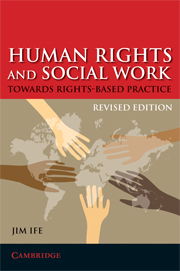Book contents
- Frontmatter
- Contents
- About the author
- Acknowledgments
- Introduction
- 1 Human Rights in a Globalised World
- 2 Human Rights: Beyond Traditional Formulations
- 3 Public and Private Human Rights
- 4 Culture and Human Rights
- 5 Human Rights and Human Needs
- 6 Human Rights and Obligations
- 7 Ethics and Human Rights
- 8 Participation in the Human Rights Discourse
- 9 Constructing Human Rights for Social Work Practice
- 10 Achieving Human Rights through Social Work Practice
- 11 Respecting Human Rights in Social Work Practice
- 12 Conclusion: Prospects for Human Rights Practice
- Appendix I The Universal Declaration of Human Rights
- Appendix II Other Human Rights Declarations, Treaties and Conventions
- References
- Index
Appendix I - The Universal Declaration of Human Rights
- Frontmatter
- Contents
- About the author
- Acknowledgments
- Introduction
- 1 Human Rights in a Globalised World
- 2 Human Rights: Beyond Traditional Formulations
- 3 Public and Private Human Rights
- 4 Culture and Human Rights
- 5 Human Rights and Human Needs
- 6 Human Rights and Obligations
- 7 Ethics and Human Rights
- 8 Participation in the Human Rights Discourse
- 9 Constructing Human Rights for Social Work Practice
- 10 Achieving Human Rights through Social Work Practice
- 11 Respecting Human Rights in Social Work Practice
- 12 Conclusion: Prospects for Human Rights Practice
- Appendix I The Universal Declaration of Human Rights
- Appendix II Other Human Rights Declarations, Treaties and Conventions
- References
- Index
Summary
THe universal declaration of Human Rights was passed by the UN General Assembly and assented to by the nations of the world in 1948. It represents a remarkable global consensus on human rights, and although some of its wording may now be open to re-evaluation, and certainly its articles are not by any means universally adopted in practice, it still remains the international human rights document with the greatest moral force. From the point of view of this book it is a key reference for all social workers.
Preamble
Whereas recognition of the inherent dignity and of the equal and inalienable rights of all members of the human family is the foundation of freedom, justice and peace in the world,
Whereas disregard and contempt for human rights have resulted in barbarous acts which have outraged the conscience of mankind, and the advent of a world in which human beings shall enjoy freedom of speech and belief and freedom from fear and want has been proclaimed as the highest aspiration of the common people,
Whereas it is essential, if man is not to be compelled to have recourse, as a last resort, to rebellion against tyranny and oppression, that human rights should be protected by the rule of law,
Whereas it is essential to promote the development of friendly relations between nations,
Whereas the peoples of the United Nations have in the Charter reaffirmed their faith in fundamental human rights, in the dignity and worth of the human person and in the equal rights of men and women and have determined to promote social progress and better standards of life in larger freedom,
- Type
- Chapter
- Information
- Human Rights and Social WorkTowards Rights-Based Practice, pp. 229 - 236Publisher: Cambridge University PressPrint publication year: 2008



